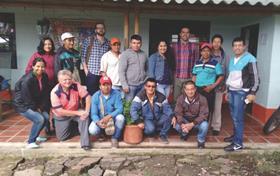
It is generally accepted that the fragmented structure of Colombia’s fruit industry, which is dominated by small farmers with a couple of hectares, is one of the biggest barriers to the country fully realising its export potential. Encouraging growers to form cooperatives or producer organisations would enable them to export directly to markets like Europe and Asia, thereby significantly improving their revenue.
Spanish agri-food agency Acodea has been working to promote the cooperative model in Colombia by providing advice and training to farmers since 2017 and recently opened an office in Bogotá. The agency currently works with five organisations in the departments of Nariño, Cauca, Antioquia and Magdalena involved in the production of bananas, avocados, cocoa, coffee and honey.
“Colombia has huge potential to export fruit, but the country faces a number of challenges,” says Paula Sánchez. “Generally speaking, productivity levels are low and farmers lack the specialised technical assistance in production, packaging and logistics that would help them improve yield ratios and extend the shelf-life of the fruit. At the same time, they need to understand that the international market demands natural products that have been grown using as few pesticides as possible. It is essential to take this into account in order to have greater possibilities of access to new markets.”
One of the key aspects of Acodea’s work is its Agripoolers network, through which members of cooperatives and producer organisations are encouraged to exchange experiences with peers in order to advance their knowledge.
“These agripoolers form a network based on learning between peers who have experienced the same problems and connect through empathy, favouring the development of knowledge and the exchange of experiences,” Sánchez explains.
The cooperative movement is gaining momentum in Colombia. According to Confecoop’s 2016 report, there were 6.1m cooperative members that year, equivalent to 12.58 per cent of the population, generating an annual income of US$27.88bn. These figures represent a significant increase on the previous year.
One of the cooperatives that Acodea works with is Cooperativa Agromultiactiva San Bartolo in Andes (Comsab), a group of around 600 of banana, plantain and avocados in the south west of Antioquia.
“Comsab was created almost 25 years ago by the area’s coffee growers to sell the bananas and plantains that also grew on their farms. We provide advice on a range of issues, from marketing to finance, to strengthen the business and the way it is structured,” says Sánchez.
“One initiative involved twinning Comsab with a Spanish cooperative in the same sector to help it identify was of improving its production techniques. We also organised a workshop to motivate young people to join the cooperative to guarantee its long-term viability.”
Another reason to support the cooperative model is that it aligns perfectly with the goals set out under the recently signed peace agreement and government’s wider agenda for rural reform.
Until now, the cooperative model in Colombia has been more of an urban phenomenon (centring on credit and savings provision) with two notable exceptions: coffee and milk. “Other sectors like cocoa, fruit, flowers and sugar cane still have a long way to go. But we are convinced that cooperatives provide one of the best ways to help small farmers to improve their production, raise the quality bar and increase their income, thus contributing to the breakdown of social barriers and development in rural areas,” Sánchez concludes.



